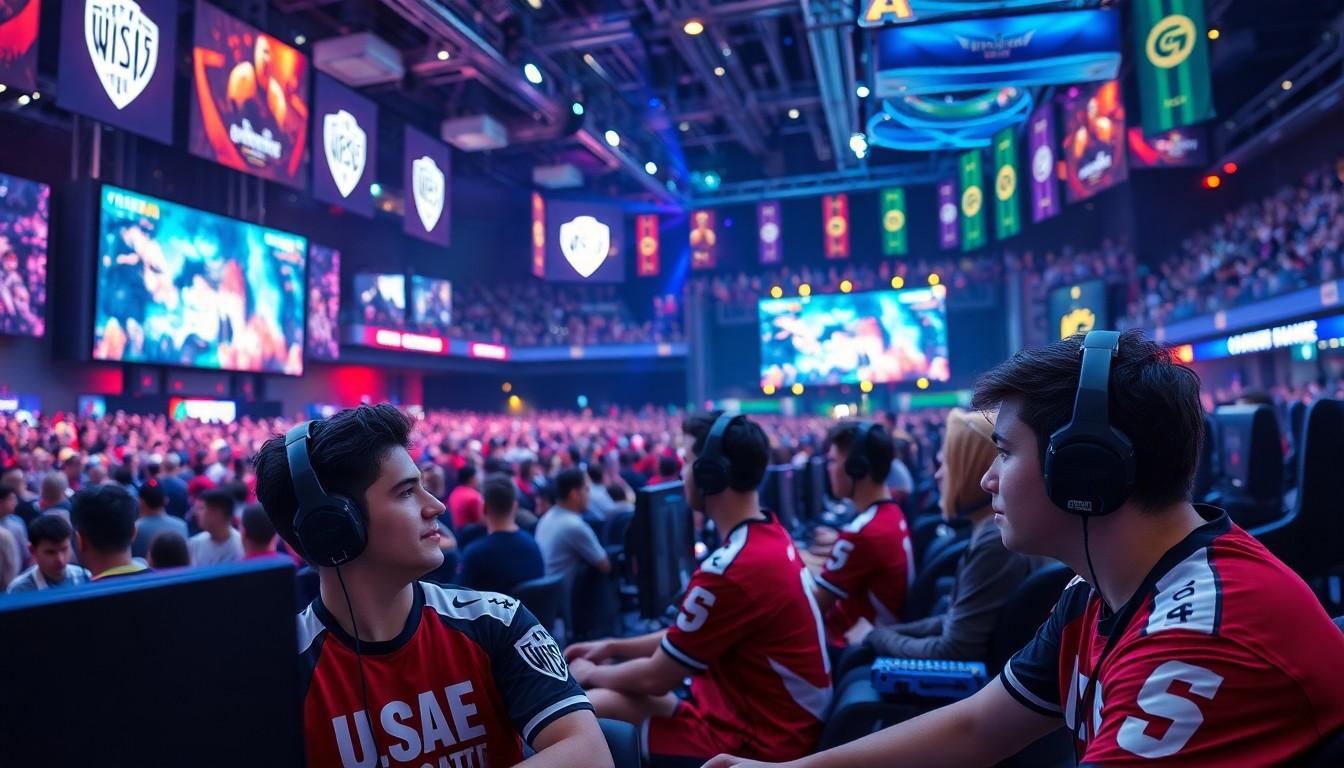
What Are the Biggest Esports Games? Discover the Top Titles Dominating the Scene
In the world of competitive gaming, some titles rise above the rest, capturing the hearts of millions and turning players into legends. Imagine a realm where strategy meets skill and teamwork can make or break a game. Welcome to the exhilarating universe of esports, where the biggest games aren’t just played—they’re celebrated like rock concerts with a side of adrenaline.
Overview of Esports
Esports encompass a wide array of multiplayer video games played competitively by professional players. Competitive gaming thrives on skill and strategy, drawing millions of viewers from around the globe. Each title presents unique gameplay mechanics, requiring teamwork and communication among players. These games cater to diverse audiences, further solidifying esports’ position in the entertainment industry.
Some of the most popular esports games include titles such as League of Legends, Dota 2, and Counter-Strike: Global Offensive. League of Legends holds a massive player base, with tournaments offering prize pools that often exceed $1 million. Dota 2 is celebrated for its International tournament, boasting the largest prize pool in esports history, which surpassed $40 million in 2021. Counter-Strike: Global Offensive fosters a competitive environment, featuring various leagues and tournaments held year-round.
Various genres contribute to the esports landscape, including first-person shooters, multiplayer online battle arenas, and real-time strategy games. Each genre appeals to different player preferences, promoting a rich competitive ecosystem. Major tournaments often fill stadiums, attracting thousands of live attendees while streaming online garners millions of views.
Esports organizations and teams continue to grow, signing talented players and securing sponsorships. These entities push the boundaries of professional gaming, elevating the industry to new heights. With the integration of advanced technology, the potential for viewer engagement increases, enhancing the overall spectator experience.
As esports continues to evolve, its impact on both gaming culture and mainstream entertainment becomes increasingly evident.
Criteria for Ranking

Several criteria determine the ranking of esports games, including popularity, player base, and prize pools. Each factor plays a crucial role in defining a game’s stature in the competitive gaming landscape.
Popularity
Popularity reflects the viewership numbers and community engagement surrounding a game. Titles like League of Legends, Dota 2, and Counter-Strike: Global Offensive consistently attract millions of viewers during tournaments. Streaming platforms host thousands of hours of live gameplay, enhancing overall visibility. Social media activity also fuels discussions and promotes events, significantly impacting player and spectator interest. Additionally, historical events and established fan bases contribute to sustained popularity, making these games household names in the esports arena.
Player Base
The player base indicates the number of active participants engaging with a game. Popular esports titles often boast millions of registered players enjoying competitive gameplay daily. Community-driven events and casual matches further expand this number. For instance, League of Legends typically sees over 100 million monthly active players. Such a robust player base encourages continuous content updates and player retention strategies. A diverse audience also fosters inclusivity within the gaming community, which can draw in newer players and keep the competitive scene lively.
Prize Pools
Prize pools cater to the financial incentives that attract top talent in esports. Games like Dota 2 lead the industry with staggering prize pools, showcasing the level of competition. The International 2021 featured over $40 million, illustrating how esports tournaments offer substantial rewards. Players and teams often rely on these competitions for their income. Increased sponsorship deals and crowdfunding efforts also contribute to elevating prize pools across various games. Such financial opportunities encourage elite players to pursue careers, thereby enhancing the competitive environment.
The Biggest Esports Games
Esports games capture the attention of players and fans, with several titles dominating the competitive landscape.
League of Legends
League of Legends leads the esports scene with over 100 million monthly active players. This multiplayer online battle arena game thrives on teamwork and strategic gameplay, fostering a passionate community. Exciting tournaments, like the World Championship, attract millions of viewers, showcasing the best teams globally. Prize pools often exceed $5 million, offering substantial rewards to top performers. Notable teams, including SK Telecom T1 and Fnatic, exemplify the competitive spirit inherent in this game.
Dota 2
Dota 2 remains a heavyweight in esports, known for its strategic depth and complex mechanics. It boasts a dedicated player base that fuels its competitive scene, with over 7 million active players. The International, its premier tournament, made history in 2021 with a prize pool surpassing $40 million. Spectators relish the high-stakes matches featuring legendary teams like Evil Geniuses and Team Liquid. Dota 2’s engaging gameplay continues to attract viewers, reinforcing its influential status within the esports community.
Counter-Strike: Global Offensive
Counter-Strike: Global Offensive remains a cornerstone of first-person shooters with a vibrant esports ecosystem. Competitive gameplay emphasizes teamwork, precision, and strategy, appealing to both casual and professional players. Major tournaments, such as the Major Championships, draw huge audiences, showcasing elite teams like Astralis and FaZe Clan. Prize pools for these events often reach millions of dollars, incentivizing high-level competition. The game’s legacy and ongoing updates keep it relevant and exciting for fans.
Fortnite
Fortnite has transformed the gaming landscape with its unique blend of battle royale and building mechanics. Millions of active players participate in its engaging gameplay, providing a diverse competitive environment. The Fortnite World Cup stands out with a staggering prize pool of $30 million in 2019, which drew significant media attention. High-profile players like Bugha gained fame through these tournaments, captivating audiences worldwide. Its continual updates and events keep the community engaged and invested.
Call of Duty
Call of Duty remains a staple in competitive gaming, known for its fast-paced action and tactical gameplay. With a large and diverse player base, it appeals to players who enjoy first-person shooter mechanics. The Call of Duty League exemplifies its professionalism, featuring franchises from major cities worldwide. Significant events showcase thrilling matchups, with prize pools often exceeding $2 million. Teams like Atlanta FaZe and Dallas Empire highlight the level of competition and strategy within this beloved title.
Impact on Gaming Culture
Esports games significantly shape gaming culture, influencing how players interact and engage with each other. The massive popularity of titles like League of Legends and Dota 2 has created vibrant communities both online and offline. These communities foster teamwork, communication, and strategy, which are essential for success in competitive play.
Spectatorship plays a crucial role in the esports landscape. Millions tune in to watch tournaments, with platforms like Twitch and YouTube providing live streams and highlights. This engagement has made watching esports akin to attending traditional sporting events due to the shared excitement and adrenaline. Events such as the Fortnite World Cup and The International draw large crowds, enhancing the overall spectator experience.
Player recognition and career opportunities have escalated due to the rise of esports. Many players earn lucrative salaries and sponsorships, showcasing their skills on global stages. As a result, younger generations aspire to follow in the footsteps of their favorite players, which reinforces gaming culture’s competitive aspect.
The financial aspect of esports continues to grow, with record-breaking prize pools attracting top talent. High-stakes tournaments provide significant motivation for players, enhancing the commitment to mastering their games. Dota 2’s International prize pool, for instance, has surpassed $40 million, underlining the seriousness of competitive gaming.
Additionally, educational institutions are beginning to recognize esports. Some universities offer scholarships and dedicated programs for aspiring players. This recognition further integrates esports into mainstream culture, elevating its status within the broader gaming community.
Conclusion
The landscape of esports is ever-evolving with major titles consistently pushing boundaries and captivating audiences. Games like League of Legends, Dota 2, and Counter-Strike: Global Offensive not only showcase incredible skill and strategy but also foster vibrant communities that thrive on competition.
As esports continues to grow in popularity and financial backing, it’s clear that these games are more than just pastimes. They represent a cultural shift in entertainment and career opportunities for aspiring players. With the rise of tournaments and sponsorships, the future of esports looks promising, making it an exciting space for both players and fans alike.
